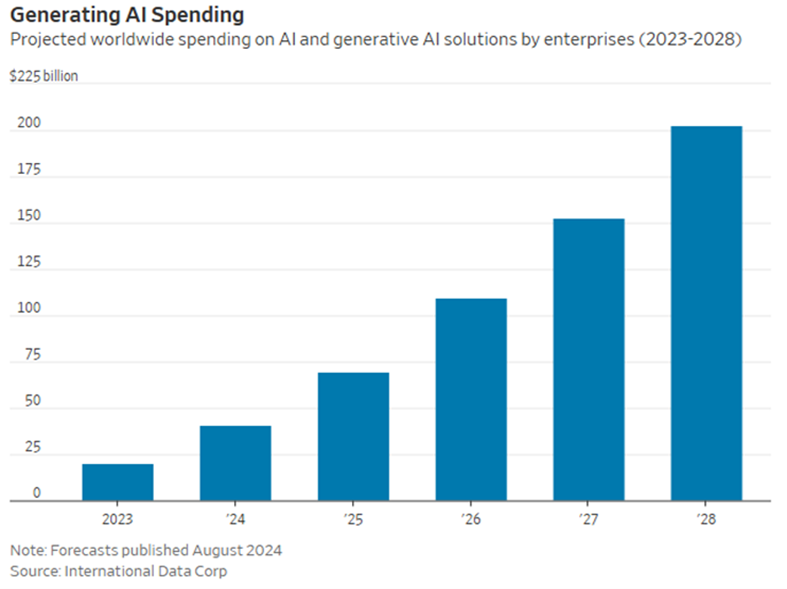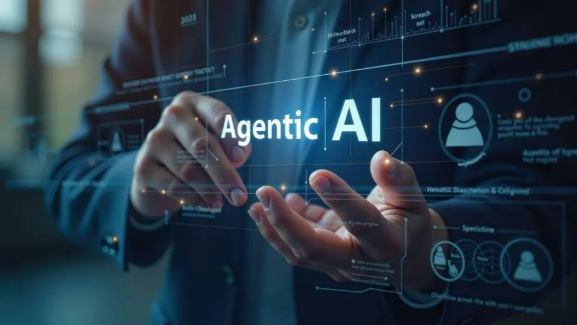By Seda Palaz Pazarbasi and Lacey Olsen
GenAI is no longer a futuristic concept, it’s a tool transforming industries in real-time. At the forefront of this transformation are AI agents, autonomous systems designed to perform specific tasks, make decisions, and continuously learn. From customer service bots to advanced analytics systems, these agents are reshaping how businesses operate.
Adoption is accelerating rapidly: According to IDC, spending on GenAI is projected to reach $202.2 billion by 2028, accounting for nearly a third of all AI spending. Gartner also predicts that by 2028, one in three enterprise software applications will use AI agents, enabling 15% of day-to-day work decisions to be made autonomously, a significant leap from almost none in 2024.

So, What Are AI Agents, and How Do They Differ from Traditional AI?
AI agents are advanced software systems capable of autonomously gathering and analyzing data, making decisions, and executing tasks. What sets them apart is their ability to learn and adapt continuously, enhancing performance over time without needing reprogramming.
Unlike traditional AI/ML systems that often require human intervention to act on insights, AI agents function with a higher level of autonomy. An AI agent can learn from their environment, devise complex plans, and carry out tasks independently.
And Why Do They Matter in Marketing?
In marketing, the role of AI agents is particularly exciting. They go beyond helping marketers navigate a dynamic environment, enabling new levels of personalization, efficiency, and meaningful impact.
Key benefits include:
- Efficiency and Cost-Effectiveness: Automating repetitive tasks like data entry and reporting streamlines workflows and optimizes resource use, with McKinsey estimating AI agents can boost marketing productivity by 5–15% of total spend while delivering high ROI.
- Deeper Insights and Personalization: Today, 76% of consumers get upset when they don’t get that personal touch when interacting with brands. AI-driven analytics provides deep consumer insights, empowering businesses to guide strategies, anticipate challenges, and seize opportunities effectively.
- Scalability: AI agents streamline processes, breaking silos to manage campaigns across channels. By unifying data into a single performance model, they provide a clear view of metrics like ROAS, CPC, and CTR.
- Most importantly, Autonomous Execution: AI agents have evolved beyond analysis to independently U. By adapting to real-time data and collaborating with other agents, they efficiently optimize campaigns, quickly adapt to market shifts, reduce workloads, and enhance agility and competitiveness.
For early adopters, AI agents are more than just tools, they’re game-changers redefining modern marketing. To understand their potential, let’s explore some real-world examples showcasing how they are utilized in the marketing space.
How AI Agents are Leveraged in Marketing Today
By managing tasks, making decisions, and learning from interactions, AI agents enhance customer engagement and boost operational efficiency. Below are recent case studies illustrating their real-world impact:
- Yum Brands’ AI Agents for Marketing Campaigns Yum Brands, the parent company of Taco Bell, Pizza Hut, and KFC, employs AI agents to craft personalized marketing campaigns. These agents analyze customer data to customize email marketing based on factors like time and day, tailoring offers to individual behaviors. Compared to traditional digital marketing campaigns, they generate double-digit increases in consumer engagement, leading to more increased purchases.
- eBay’s AI Agent Enhancing Digital Sales Experiences eBay utilizes AI agents to autonomously code and elevate sales experience, streamlining processes and enhancing efficiency. eBay’s AI-powered magical bulk listing tool speeds up product listings, while other AI features enhance images, social posts, and personalized shopping. The company is also preparing to introduce agents designed to assist buyers in discovering products.
- JLL’s AI Agents for Marketing Operations JLL, a global real estate services firm, has developed AI agents to enhance marketing and operational processes. Their proprietary JLL GPT model accelerates tasks such as partnership agreement processes, reducing completion time from two-months to under five hours. Additionally, AI solutions are implemented for client interactions, enabling 24-hour availability and improving overall efficiency.
How Neuronn AI Can Help
AI Agents excel in processing large-scale data, identifying patterns, and implementing strategies with efficiency and autonomy, far beyond human capabilities. Their potential is expansive, they can integrate seamlessly into your teams to draft briefs, uncover customer insights, manage and execute campaigns, score leads and more, significantly enhancing productivity and decision-making.
At Neuronn AI, our team of experts provides personalized consulting to help businesses leverage the full power of AI, giving them a strong edge over the competition. Our tailored training and education programs offer hands-on experience with real-world tools, focusing on foundational knowledge and practical skills to understand and utilize AI agents effectively. Whether you’re looking to personalize your marketing, streamline your operations, or unlock powerful consumer insights, our team is here to guide you every step of the way.
Curious about how AI can elevate your marketing? Let’s explore the possibilities together and unlock the potential of AI agents for your business. Visit our website to learn more and see how you can get started with AI today.
Neuronn AI’s advisors include Alex Kalinin, Carlos F. Romero, Enrique Ortiz, Lacey Olsen, Owen Nwanze-Obaseki, Rick Gupta, Seda Palaz Pazarbasi, Sid Palani, and Vik Chaudhary.

Leave a Reply